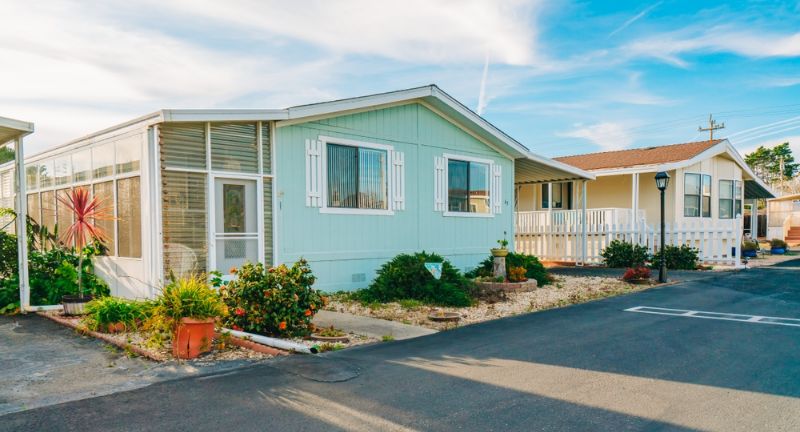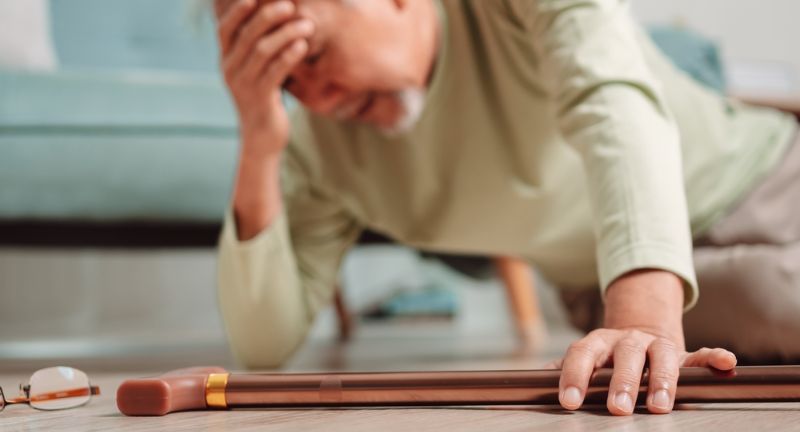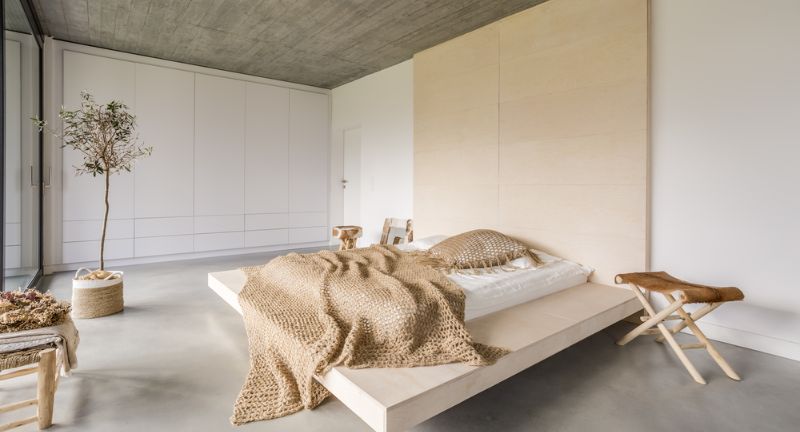NEWS
20 Motivations Behind Baby Boomers’ Shift to Minimalism
Published
9 months agoon

Shutterstock
In recent years, Baby Boomers have increasingly embraced minimalism, driven by factors resonating deeply with those born between 1946 and 1964. This shift towards a simpler lifestyle is motivated by desires to reduce clutter, alleviate stress, and practically downsize for retirement. It also reflects a profound change in values from material possessions to enriching experiences. Exploring the reasons behind this trend reveals how minimalism simplifies life while enhancing it, offering freedom, peace, and fulfillment in their golden years.
The Benefits of Downsizing When Moving to Community Living

Shutterstock
When transitioning to community living or assisted living facilities, significant downsizing is often required. This process aligns well with minimalist principles, as it involves choosing only the most essential items for a new, typically smaller, space. Living in a community setting can also enhance social interactions, which becomes easier when one isn’t burdened by excessive possessions. In this context, minimalism not only simplifies the physical space but also promotes a more socially active lifestyle.
Value Shifts

Shutterstock
As Baby Boomers age, many notice a transformation in their values, moving from the accumulation of goods to the appreciation of experiences. This change naturally decreases the desire for material possessions and enhances the value placed on relationships and activities that add richness to life. Minimalism aligns with this evolution by liberating resources—both time and money—to be invested in meaningful experiences. It’s not merely about owning fewer things but about creating space for what truly matters.
Influence of Peers

Shutterstock
With the rising popularity of minimalism among peers, many Baby Boomers find themselves inspired to explore this lifestyle. Observing friends and contemporaries successfully adopt minimalism often provides the essential motivation and psychological support. Peer influence can significantly drive lifestyle shifts, especially those requiring a change in mindset. This social element of minimalism reinforces the advantages and practicality of embracing a life with fewer possessions.
Navigating Life Transitions with Minimalism

Shutterstock
Major life changes like losing a spouse or relocating to a care facility often require a reassessment of one’s living environment and possessions. In these times, minimalism can act as a helpful framework for deciding what is essential and what can be discarded. This decluttering process can offer both emotional relief and practical benefits, aiding in the management of a challenging emotional period. Adopting minimalism during such transitions can alleviate some of the emotional and physical stresses associated with these changes.
Considerations for Your Legacy

Shutterstock
Many Boomers are aware of the burden that sorting and managing a lifetime of possessions can impose on their heirs. They prefer to declutter now rather than leave this daunting task to their children. This thoughtful downsizing is often viewed as a final act of caring, ensuring that their legacy is one of simplicity and order rather than burden. It’s a way to ease the responsibilities associated with inheriting a large collection of belongings.
Freedom from Consumerism

Shutterstock
There is a growing disillusionment among some Baby Boomers with the consumer-driven culture of accumulation. Embracing minimalism allows them to step back from incessant buying and focus on what is essential. This philosophical shift is not just about spending less but about promoting a more thoughtful and deliberate approach to consumption. Breaking free from the cycle of consumerism can lead to a more content and less cluttered lifestyle.
Economic Efficiency

Shutterstock
Embracing minimalism can result in substantial cost savings, which is especially appealing for Baby Boomers managing their retirement budgets. By making fewer purchases and adopting a more streamlined lifestyle, they can reduce their spending on non-essential items. This economic efficiency enables better allocation of resources towards experiences and healthcare, which are often priorities during this phase of life. The transition to minimalism not only conserves money but also ensures that spending is aligned with actual needs, thereby enhancing financial stability.
Quality over Quantity

Shutterstock
In their later years, many Boomers prioritize the quality of goods over having a large quantity of items. This preference leads to purchasing fewer, but higher quality items that will last longer and provide greater satisfaction. This approach not only reduces clutter but also respects the environment by decreasing waste. The focus on quality over quantity reflects a mature appreciation for craftsmanship and sustainability, key tenets of the minimalist philosophy.
Health Benefits of Minimalism

Shutterstock
Maintaining a clean and uncluttered environment is essential for both physical and mental well-being, particularly as individuals get older. Embracing minimalism can help alleviate stress and anxiety associated with cluttered spaces. Additionally, having an organized home can reduce the risk of falls and accidents, which are major concerns for older adults. Therefore, minimalism not only enhances the visual appeal of a living space but also fosters a safer and healthier environment.
Efficiency in Cleaning

Shutterstock
Minimalism results in having fewer items, which consequently reduces the time needed for cleaning and maintenance. This efficiency is particularly appreciated by Baby Boomers, who prefer to spend their time on hobbies, traveling, or being with family rather than on household chores. A minimalist home is more manageable and easier to keep tidy, which is crucial for individuals who may encounter physical limitations as they age. Therefore, the ease of maintaining a minimalist home contributes significantly to a higher quality of life.
Stress Reduction

Shutterstock
Clutter has a notable impact on increasing stress and anxiety, which are elements that Baby Boomers are particularly eager to remove from their lives. Embracing a minimalist lifestyle allows them to cultivate a more serene and harmonious living space. This decrease in stress supports improved mental health and fosters an overall sense of well-being. As Boomers look for more peace during their later years, minimalism presents a practical approach to attaining that tranquility.
Desire for Mobility

Shutterstock
Baby Boomers are experiencing greater freedom to travel and relocate thanks to fewer physical commitments. Embracing minimalism improves mobility by making it easier to move for travel or seasonal residence changes. This flexibility is particularly attractive during retirement, allowing for new experiences and exploration. Minimalism reduces many logistical barriers, offering the freedom that many Boomers seek at this stage of their lives.
Adaptability

Shutterstock
Minimalism aids Baby Boomers in staying adaptable to life’s changes, which becomes particularly crucial as they encounter the diverse challenges that come with aging. By avoiding an overabundance of possessions, it becomes simpler to adjust to new living arrangements or health conditions. This flexibility is essential for upholding independence and handling sudden lifestyle changes. Embracing minimalistic principles thus offers a practical approach for gracefully and effortlessly managing the complexities of later life.
Aesthetic Preferences

Shutterstock
The clean, uncluttered lines of minimalist design appeal to many Baby Boomers who appreciate modern aesthetics. This style not only enhances the visual appeal of their living spaces but also promotes a calming environment. The preference for minimalist design often reflects a broader desire to live in a space that embodies tranquility and order. As Boomers redecorate or move, they often choose minimalist designs that reflect their current tastes and lifestyle needs.
Embracing Technology

Shutterstock
Technological advancements have allowed Baby Boomers to replace physical possessions with digital versions. Whether it’s e-books, online photo albums, or streaming services, technology helps reduce physical clutter. Adopting these digital tools not only declutters homes but also ensures that Boomers stay connected to contemporary trends. This embrace of technology fosters a minimalist lifestyle while maintaining cultural relevance.
Embracing a Simpler Lifestyle

Shutterstock
As they age, many Baby Boomers are drawn to a simpler, less hectic lifestyle, often embracing the principles of minimalism. By reducing clutter and excess in their homes, they can concentrate on what truly matters: relationships, health, and personal growth. Adopting a minimalist approach helps eliminate distractions and the stress associated with managing numerous possessions. In the end, this simplicity can contribute to a more fulfilling and peaceful daily life.
Decluttering for Retirement

Shutterstock
As Baby Boomers transition into retirement, they often find that large homes no longer suit their lifestyle, leading to a trend toward minimalism. Downsizing to smaller residences not only makes maintenance more manageable but also addresses the practicalities of aging. This move to more convenient living spaces offers greater freedom and reduces financial strain. It’s a natural step to prioritize comfort and functionality in living arrangements when entering this new stage of life.
Environmental Sustainability and Minimalism

Shutterstock
Increasing awareness of environmental sustainability has led many Baby Boomers to embrace a minimalist lifestyle. By reducing consumption and opting for items with minimal packaging, they help decrease waste and preserve resources. This eco-friendly mindset goes beyond personal gain, demonstrating a dedication to ensuring a healthier planet for the coming generations. Embracing minimalism is viewed as a responsible decision that aligns with the rising ecological concerns.
Ease of Maintenance

Shutterstock
Smaller living spaces and fewer possessions naturally lead to less time spent on maintenance and upkeep. This reduction in daily chores is especially beneficial as Baby Boomers grow older and perhaps less physically able to handle intensive upkeep. Having fewer items also reduces the cognitive load of organizing and cleaning, which can enhance mental well-being. Minimalism thus supports a lifestyle that is not only physically more manageable but also mentally more relaxing.
Minimalism and Spiritual Growth

Shutterstock
Many Baby Boomers embrace minimalism as a component of their spiritual journey, aiming to remove distractions that obscure their focus or tranquility. This often means letting go of belongings that no longer have a purposeful or joyful presence in their lives. By adopting a minimalist lifestyle, they create an environment conducive to introspection and self-awareness, promoting spiritual growth. This choice reflects a profound quest for meaning and fulfillment in the later stages of life.
Conclusion

Shutterstock
The reasons Baby Boomers are embracing minimalism are diverse and compelling. They seek a more manageable lifestyle that reduces stress and clutter, and they’re adopting a philosophical shift towards valuing experiences over material possessions. This trend highlights a broader change in priorities. By following minimalist principles, Baby Boomers are discovering practical benefits as well as deeper satisfaction and a renewed sense of purpose. Ultimately, for Baby Boomers, minimalism is about more than just owning fewer items—it’s about creating space for life itself, showing that sometimes, less truly is more.
More Money + Investing
-


Want the Job? Avoid Asking These 22 Interview Questions
-


20 Sneaky Habits That Could Sabotage Your Retirement
-


21 Energy-Hungry Home Gadgets That Spike Your Monthly Power Bill
-


17 Unmistakable Clues That Someone Is Gaslighting You
-


21 Brands That Have Stirred Up The ‘Woke’ Debate
-


15 Things You Should Never Do At A Funeral
-


4 Harmful Penny Pinching Habits That Are Sabotaging Retired Boomers
-


20 Budget-Friendly Foods for a Healthier Heart
-


20 Sports That Are Losing Popularity At a Fast Pace
-


Mortgage Demand Continues to Fall Despite Drop In Interest Rates
-


25 Things That Deserve More Social Acceptance
-


19 Valid Baby Boomer Gripes That Make Total Sense
